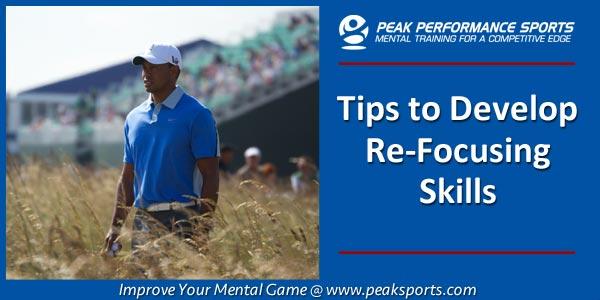
Do You Think About The Last Shot You Made?
Have you ever been haunted by your last golf shot, whether it be a poor tee shot or missing a critical putt?
PROBLEM: Many golfers have difficulty focusing after a bad shot to the point that their performance drastically declines over the next few shots (The Negative Performance Cycle).
Think of a golf tournament where you were plagued by a bad shot…
As soon as you hit the ball, you knew the end result was going to be bad… You were mad and frustrated… You verbally assaulted yourself…
It took you several shots to calm down slightly… But by that time, you misplayed a few more shots and added several shots to your score.
To compound the problem, you knew that you were unraveling and needed to focus, but you felt helpless and unable to regain your composure.
You told yourself, “Focus, focus, focus” but all you could think about was THAT BAD SHOT and how it was affecting your score. You were DWELLING…
You even felt bad about feeling bad which only kept you stuck in negative and unproductive emotions.
Negative reactions to bad shots lead to a host of negative emotions (anger, frustration, sadness). The negative emotions, if not managed effectively, lead to negative self-talk, lower confidence, a build-up of anxiety and the expectation of future bad shots.
The many consequences caused by a negative reaction compete for your attention on the golf course and scatter your focus for the next shot.
SOLUTION: Regaining your focus after a poor shot is critical to peak performance in golf.
Re-focus to cut the dwelling on the past…
Contrary to popular belief, the bad shot did not initiate your frustration, but rather your beleif about that bad shot. For example, three-putting is not frustrating by itself. Only you make it so…
Some golfers can quickly and objectively gain valuable feedback from a bad shot that can help them for later shots (swing, club selection, the greens, wind, etc.).
These golfers may get mad about the bad shot, but they quickly refocus on what needs to be done NOW and how they need to play the next shot.
Refocusing may be difficult when playing with the pressure of competition, but you can develop this critical mental skill with some work.
Try these tips to develop your re-focusing skills:
Tip #1: Learn to manage emotions instead of trying to control them. It’s okay to get angry but take a few seconds, breathe deep, settle down and get to the task at hand. Develop and practice a relaxation strategy that you can utilize on the golf course.
Tip #2: Work on refocusing in practice. Define a routine that you will follow after a bad shot (deep breath, objectively and quickly find the feedback, plan next shot, commit to the shot, perform pre-shot routine). After a bad shot in practice, utilize your routine to refocus. The more you practice your routine, the better you will be able to refocus during tournaments.
Related Sports Psychology Articles
- Hitting That One Important Shot Under Pressure
- When Missing Shots Early in Game
- Helping Young Golfers Overcome Bad Shots
*Subscribe to The Sports Psychology Podcast on iTunes
*Subscribe to The Sports Psychology Podcast on Spotify
Download a free sports psychology report to improve your mental game!
Learn more about our one-on-one mental game coaching.
Golfer’s Mental Edge

What’s the big sign that your mental game is the weak link in your golf game? When you can’t play consistently as well as when you play a practice or casual round–or your range game is way better than your game on the course. If you suffer from lack of focus, low self-confidence, poor composure or other mental game obstacles on the course, you can’t reach your true potential in golf.
The Golfer’s Mental Edge 2.0 Audio and Workbook program is ideal for any amateur, collegiate, junior, and tour professional golfer.
Golf coaches and instructors would also be wise to teach “The Golfer’s Mental Edge 2.0” principles to their players. This program is perfect for any golfer who wants to improve performance and consistency by managing their mind better on the course.
